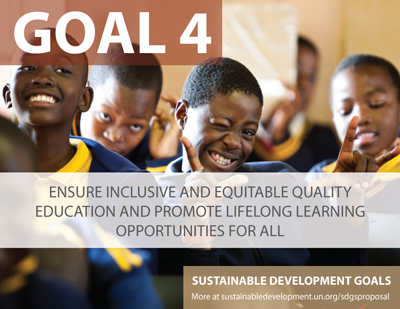|
| Workshop Partner |
|
Working Group discussing Goal 4.1 “By 2030, ensure that all girls and boys complete free, equitable and quality primary and secondary education leading to relevant and effective learning outcomes”
Background:
The Sustainable Development Goal 4 is focused on ensuring inclusive and equitable quality education and promoting lifelong learning opportunities for all. More specifically the goal 4.1 aims to “by 2030, ensure that all girls and boys complete free, equitable and quality primary and secondary education leading to relevant and effective learning outcomes”. To justify Goal 4.1, it is important to discuss the dimensions of quality education and ways to implement it with Whole Institution Approach as one of the important approach. Pedagogy and Curriculum are the means through which learnings of DESD can be brought into practice. Learning to live sustainably is the key component of goal 4.7 wherein the formal education systems has the prominent role.
 Expanding access to school education at primary level has been one of the major success stories of MDGs. The potential of transforming lives through education along with the role it plays as a main driver of development is well understood and the global leaders have committed their support with a sense of urgency to a single, renewed education agenda that is holistic, ambitious and aspirational, leaving no one behind. There is renewed focus on access, equity and inclusion, quality and learning outcomes, within a lifelong learning approach.
Expanding access to school education at primary level has been one of the major success stories of MDGs. The potential of transforming lives through education along with the role it plays as a main driver of development is well understood and the global leaders have committed their support with a sense of urgency to a single, renewed education agenda that is holistic, ambitious and aspirational, leaving no one behind. There is renewed focus on access, equity and inclusion, quality and learning outcomes, within a lifelong learning approach.
There is now a commitment that all girls and boys complete free, equitable and quality primary and secondary education leading to relevant and effective learning outcomes. The intent shown is very motivating but at the same time there is an understanding of challenges for quality education and improving learning outcomes with recognition that significant numbers of those entering formal education for the first time will no longer reap the expected benefits of educational qualifications: employment and the promise of a better future.
The Decade of Education for Sustainable Development has a lot to share and support the school education systems to achieve the SDG goals. ESD has demonstrated potential to improve competencies such as critical and systemic thinking, analytical problem-solving, creativity, working collaboratively and making decisions in the face of uncertainty, digital literacy and understanding of the interconnectedness of global challenges and responsibilities emanating from such awareness for addressing local contextual challenges of the present and the future.
Aim of the workshop:
The workshop will shared ESD experiences to reflect and discussed the ways to prepare formal education systems to prepare the society to face challenges of the world.
Objectives:
- Share the learnings from ESD in Formal Education System and evolve to achieve the ambitious targets of SDG
- Discuss whole-institution approach as a key strategy to scale-up ESD
- Understand the pedagogy, curriculum for the learnings that are required to live on a planet that is under pressure and ways of organizing and discuss the challenges.
- Understand the workable strategies for strengthening the curriculum, textbooks, quality of teaching–learning processes, assessment, ICT etc. for better outcomes
- Discuss the ways of engaging parents and other stakeholders to see the role of education beyond employment.
Outcome:
- Identified the dimensions of quality in formal education systems for achieving SDG.
- Shared best practices of whole institution approach.
- Pedagogy for developing competencies.
- Identified needs for research, measurement and evaluation.
CEE Focal point: Pramod Kumar Sharma, Preeti Kanaujia
[email protected], [email protected]
Workshop Session Detail:
| Date & Time | Session Title |
Jan 11, 2016 |
|
Session I (1.5 Hrs.) |
Dimensions of Quality Education Dr. Bhushan Punani, Executive Secretary, Blind People’s Association |
Session II |
Whole Institution Approach to foster sustainability Alexander Leicht, Chief of Section - ESD, UNESCO, Paris |
Launch of Global Handprint Network18:00-18:30 (30 min) |
|
Jan 12, 2016 |
|
Session III |
Pedagogy, Curriculum and Learning Outcomes (Competencies) for living sustainably Dr. Jim Taylor, Director of Environmental Education for WESSA |
Session IV |
Approaches to measure the learning to live sustainably Aaron Benavot, Director, EFA Global Monitoring Report |
Jan 13, 2016 |
|
Session V |
Paper Presentation Simantini Dhuru, Director at Avehi-Abacus Project Presenters: Ms. Miki Saito
|
Working Session VI |
Exchanging ideas with 2016 Global Education Professional Learning Conference( University of Tasmania) - Online |
Session VII |
Formulation of Recommendations |



